General Raheel Sharif, Mukthar Thaqafi, and Dr Taqi
The current Operation Zarb-e-Azb by the Pakistan army against the Taliban is being viewed in black and white terms by a section of Pakistan’s “liberal” intelligentsia. For some in this category, the debate is based on promoting their own narrow economic or political interests, which don’t necessarily coincide with that of the rest of the country. Those 70,000+ Pakistani civilians and soldiers who have been murdered by the Deobandi Taliban terrorists and their urban allies, namely Sipah-e-Sahaba Pakistan (aka ASWJ), simply do not have the luxury of alternatives.
While the loved ones of these 70,000 dead Pakistanis are receiving their dead bodies on a daily basis, some of those who are opposing the operation are losing credibility due to their contradictory narrative. Some are busy enjoying dinners with the office bearers of and/or the travel perks of the same (allegedy ISI-friendly) think tank –Jinnah Institute- that reinforced the Good vs Bad Taliban propaganda that was popularized under at least the last Army Chief and major Taliban and LeJ facilitator, General Kayani. The selective stance of other “liberals” who aligned themselves with pro Taliban judges and other dubious sycophants means that they are fast losing their credibility.
In particular, Dr. Taqi’s sectarian tweet against Sunni Sufi and Shia activists of LUBP is distasteful and disurbing:
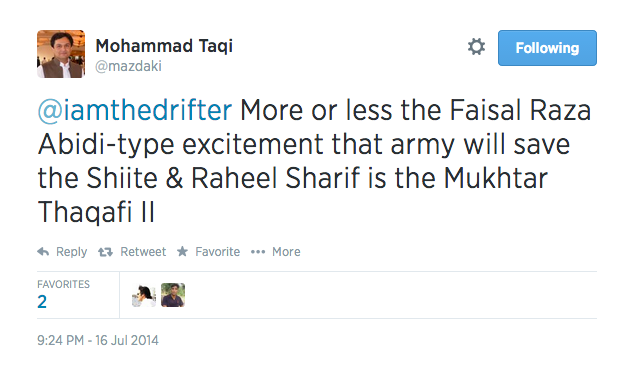
 Needless to say that Pakistan’s target killed and embattled communities such as Sunni Barelvis/Sufis, Shias, Christians, Ahmadis, Hindus and Sikhs cannot rely on pro Taliban creatures such as Nawaz Sharif, former COAS General (r) Kayani, and corrupt Pro Taliban judges like Iftikhar Chaudhry.
Needless to say that Pakistan’s target killed and embattled communities such as Sunni Barelvis/Sufis, Shias, Christians, Ahmadis, Hindus and Sikhs cannot rely on pro Taliban creatures such as Nawaz Sharif, former COAS General (r) Kayani, and corrupt Pro Taliban judges like Iftikhar Chaudhry.
The targeted communities of Pakistan certainly cannot rely on those “liberal” scholars and thinktanks that promote ASWJ-LeJ leaders and vicious Ahmadi- hate mongers as “progressives”. As well as, those sycophants (Ali Arqam) who seek common cause against LUBP with ISI-backed HDP (like Saleem Hazara) and ASWJ social media activists (like Aamir Saeed Deobandi).
https://lubpak.com/archives/241085
For too long, Pakistan’s targeted communities had no choice but to rely on the obfuscations of the elitist liberal club.
It may be recalled that LUBP has often cross posted some valuable articles by some scholars including those of Dr Taqi and will continue to do so in future as appropriate.
https://lubpak.com/archives/252959

There is Bilawal Zardari who cannot even tweet against the ASWJ-LeJ, that is killing Sunni Barelvis, Shias, Christians, Hindus and Ahmadis on a daily basis in PPP-governed Sindh. And the most horrendous of them all is PM Nawaz Sharif who is actually in a coalition with ASWJ and who has the loyalty of many of Pakistani “liberals”.
It is one thing to be skeptical of the army given its role in fostering Deobandi Jihadis. It is another to be blind to the recent events when the same army is actively cracking down on the Deobandi Taliban and ASWJ not only in North Waziristan but also in various parts of Sindh and Punjab. Being an ostrich will not change the evolving ground realities. The only ones who oppose a substantive operation against Deobandi terrorists of TTP-ASWJ are Nawaz Sharif and his minions, along with those so called Pashtun nationalists who cannot differentiate between their alien Deobandi identity and indigenous Pashtun identity.
Even Imran Khan, whose party received the majority of Pashtun votes in KP province, was quick to turn around and support the operation. The only operation that Nawaz Sharif could undertake was against the Sunni Barelvis for coming out in favor of this very operation.
However, the same rabid sectarian bias that blinds “liberals” and makes them allergic to mentioning the Deobandi identity of 95% of the terrorists in Pakistan, also causes the same group to mock and abuse the Sunni Brelvi victims of the Model Town massacre.
LUBP does not blindly support the current army action. Refer to these posts which was published just days ago. There are over 200 LUBP posts that are critical of the army’s role in fostering terrorism. (Read: https://lubpak.com/archives/316645 & https://lubpak.com/archives/316846)
But can we ignore the heterogeneity within the army. Don’t take our word for it. Refer to Dr. Ayesha Siddiqa’s own article, which highlights what has already been said on LUBP multiple times, i.e., there is no homogenous viewpoint within the army. Dr. Siddiqa talks about the Musharaf camp vs Kayani camp to describe support vs opposition to the operation against the Taliban. The Musharaf camp to which former D G ISPR Athar Abbas belongs to, as per Dr. Ayesha Siddiqa, is simply settling scores by running Kiyani down for his opposition to any operation against the Taliban. (Read: http://www.thehindu.com/todays-paper/tp-opinion/the-many-shades-of-antiterror-fight/article6183896.ece)
Then what about Dr. Siddiqa who along with many other “liberals” and “civil society activists” was also part of the discredited lawyers’ movement. If LUBP is now an ISI mouthpiece for its conditional support of the operation, then what is Dr. Siddiqa and other lawyer’s movement supporters, a movement which was supported by former DG ISI and COAS General Kiyani? (Read: https://lubpak.com/archives/317091)
Today’s operation (17 July 2014) against the TTP-ASWJ in the Deobandi heartland of Raiwand (Lahore) along with the daily operations against the Taliban in Karachi already show that this operation is not as meaningless as it being selectively portrayed. Interestingly, those “liberals” who continue to bash Pakistan army/ISI on nuruting Jihadist proxies remain completely mute on CIA and MI6’s much bigger and ongoing role in fostering Salafi and Deobandi Jihadism on a global scale, from AfPak to Libya to Iraq to Syria.
If LUBP is pro-ISI for supporting a full and unwavering Pakistan army’s operation against the Taliban, then what are those who oppose this operation? Are they also pro ISI (Kayani-Hamid Gul Chapter)?
Just a couple of months ago, LUBP interviewed and promoted Carlotta Gall’s exposure of the army’s support for Deobandi terrorists of TTP and ASWJ-LeJ; especially under the tenure of General Kayani who seemed totally subservient to Deobandi terrorists like Malik Ishaq – much like the judiciary and PML N that still enjoys the loyalty of many biased “liberals”.
One DAWN staffer, Zarrar Khuhro was so upset by LUBP’s criticism of General Kayani’s support for ASWJ-LeJ that he compared us to Nazis! Shia and Ahmadi hardliners have called us all names from Zionist agents to Qadiani agents.
Those “liberal” friends of Dr. Siddiqa and Dr. Taqi who fraternize with ASWJ and enjoy hospitality of the ISI-funded and Taliban promoting Jinnah Institute call us a “sectarian hate blog”. Bring it on. And try to make some sense while you are at it.
If LUBP can criticize Zardari, Bilawal, Obama, Khomeini, Khamenai, Sami ul Haq, Ludhyanvi, Nawaz Sharif, Imran, Hamid Mir, Mubashar Luqman, then why can’t it criticize some liberal dons whose discourse is taken as Gospel even when it is out of sync with reality. If our arguments cannot be countered, then at least come up with more intelligent ad hominems instead of relying on back stabbing sychophants. https://lubpak.com/archives/317630
Follow Zara Bokhari @ZaraBokhari on twitter

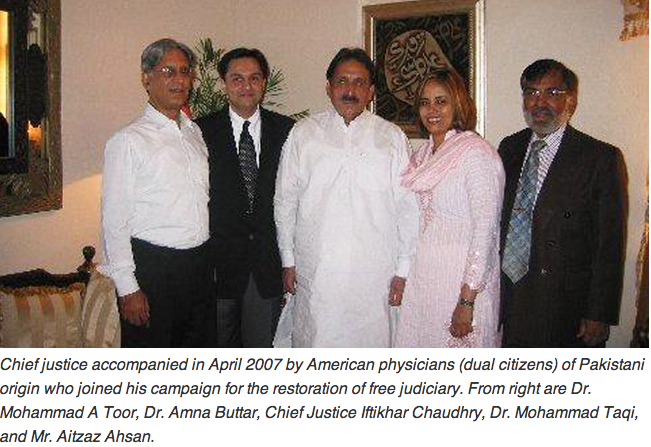



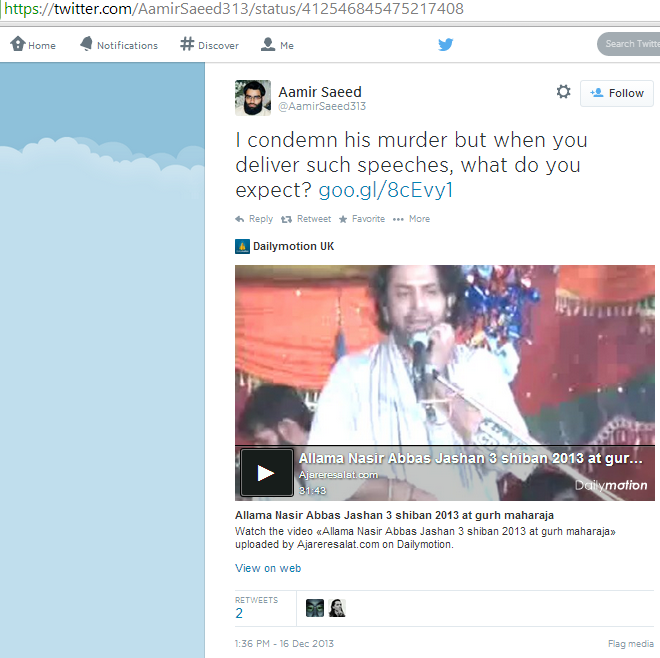

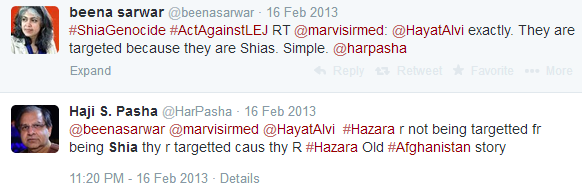

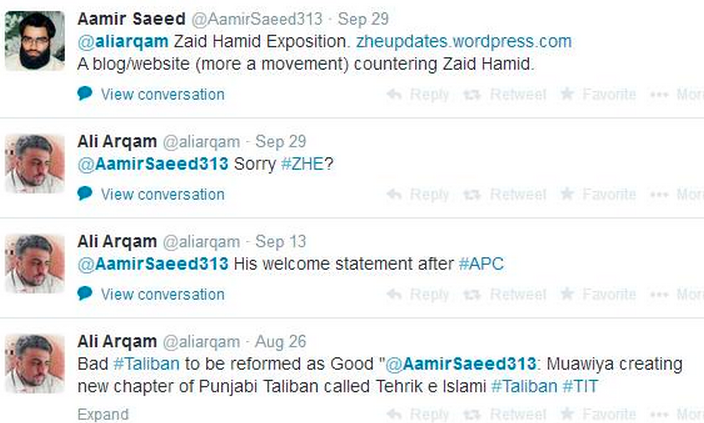



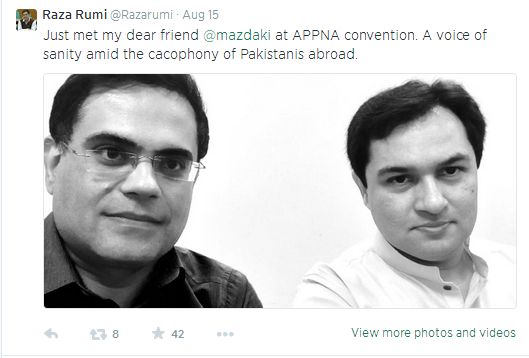
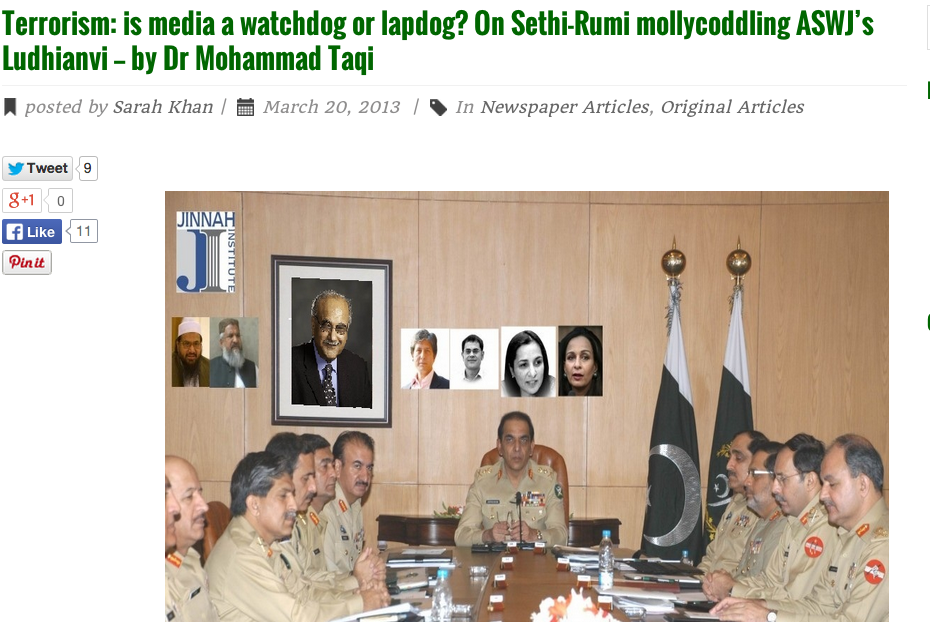

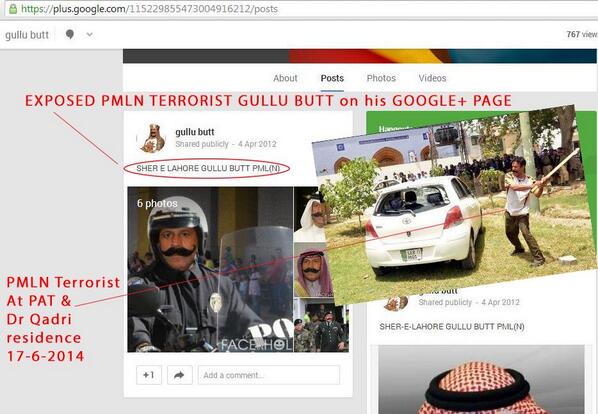
#zARA BUKHRI# THIS IS REAL FACE OF Pakistani politicians you write a good history
Too early to say what ZarbeAzb will accomplish. But, Armed forces are dying and someone is killing them. We must wait till operation is over. Agreed with LUBP’s support of ZarbeAzb as that is what we all wanted and actually rallied for in entire Pakistan.
However, Dr Taqi has been pretty vocal about oppression on non deobandis in Pakistan and we must not forget it. It is injustice if LUBP put him in line with other liberals.
I totally agree with the point of view that LUBP is an establishment mouth Piece. It attacks those who are anti establishment….. Just remember LUBP doesn’t miss a single opportunity to discredit the anti establishment Baloch Nationalists as well….
https://lubp.net/archives/311369
https://lubp.net/archives/316549
https://lubp.net/archives/302989
DAWN – Opinion; October 05, 2007
Published Oct 05, 2007 12:00am
Comment Email Print
Whose game is it?
By Ayesha Siddiqa
SEPTEMBER 29 has been marked as another dark day in Pakistan’s history. It was a day when the state’s coercion was used against innocent journalists and lawyers. The authorities felt the need to use brutal methods to control the people. Interestingly, it was also the first time in history that the police resorted to the ways of street urchins and pelted the protestors with stones.
It seems that it is not only the general public that has learnt something from the Palestinian Intifada. Such tactics were used to physically assault people like lawyers Aitzaz Ahsan and Ali Ahmed Kurd.
Apparently, the khakis are extremely unhappy with the Chief Justice’s team of lawyers and are determined to sort these people out for challenging the army chief and making comments denigrating his uniform. The regime has shown its ugly face which had been feared eight years ago when Pervez Musharraf seized power. This may not be because he is a born tyrant but due to the nature of his personal and organisational power.
Since the military lacks political legitimacy, it is bound to end up in conflict with society within a few years of taking control. The dictator starts out with good intentions but soon runs into problems created due to his utter lack of understanding of politics.
The military dictator is accustomed to another culture which is more organised and disciplined. Such a culture looks good in a bureaucracy but not in politics where different stakeholders vie for a greater share of political, financial and other resources. So, the dictator soon gets out of breath and embarks on the path of coercion. The more time he spends at the helm, the more frustrated he becomes. The more frustrated he gets the more coercive his regime is. This cycle is unchangeable when the military comes into power.
To those who believe that General Musharraf is an extraordinary man who can rise above this cyclic behaviour, one would like to pose this question: who gave orders for the brutality that was on display on May 12 and Sept 29?
Logically, (if we forget for a minute that this is not another military regime) the government should not have shown aggression soon after the Supreme Court judgment even if it wanted to send a message to the general public that any difference of opinion and act of disobedience would not be tolerated. Although pressure from several sides was mounting, Musharraf had won a round of the political battle when the Supreme Court rejected the petitions challenging his eligibility for the presidential race.
Was it Musharraf himself who ordered the police to use the tactics of street urchins? Perhaps not. He is certainly not choreographing the entire show of his regime. In fact, possibly the problem exists that he is not in total control of all parts of his government including the armed forces.
Some might consider this an extreme conclusion and would argue that he is very much in control. In this case, it is nothing more than poor intelligence which the agencies are quite capable of. Historically, the intelligence agencies have never been up to the mark in informing a regime intelligently.
In 1965, these agencies had advised the government that Kashmiris in Indian-occupied Kashmir were ready for a revolt against the Indian forces, which they were not. During the end of the 1960s and the early 1970s, these very agencies had given poor advice to the government about the reaction of the Bengali population in East Pakistan. Very recently, the agencies were found to have no information (or pretended not to have any) on the Lal Masjid crisis in the heart of the capital.
It was also a dire miscalculation on their part that the lawyers’ movement would die down within a couple of months, which it didn’t. One could go on and on about the failure of the intelligence in this blessed country.
But then, why is no one checking such failures — or is it really a question of how much General Musharraf is in control of the situation? A political crisis is a good way for the organisation to get rid of an individual when he refuses to give up. Surely, people around the top general know how greater coercion is counterproductive. More aggression will create the opposite result of what the regime would like to see.
Domestic politics, however, is not the only area where policy contradictions are obvious. One equally draws a blank in understanding the policy on militancy. Are we trying our best to eliminate the militants? Have all connections in the name of a higher strategic mission been ruptured? Or is there still a tactical linkage with some militant organisations?
It is not just that foreign agencies and think-tanks point an accusing finger at the country’s policy on the militants but available evidence also indicates covert linkages.
The obvious question is: why is nothing being done about the Lashkar-i-Taiba and Jaish-i-Mohammad leadership when they are in the country and the agencies know about their hideouts? Then there are stories about linkages with some Taliban elements in Waziristan while there is a battle going on with others. Surely, this brings lots of questions to mind to which there are some possible explanations.
First, as part of the war tactic it is not possible to completely end relations with the enemy. There is always the possibility of co-opting some and thus breaking the power of the enemy.Second, there is a conscious plan to resurrect a Wahabi state which would then lead to creating the historical Islamic empire that a number of people dream about. Some such people have also been referred to by the general-president in his speeches in which he talked about former senior military officers with links to the extremists.
The Taliban style of governance is a good method of centralised control of a vital region. This is certainly what many in government and among analysts learned from the Taliban rule in Afghanistan. The defenders of the Taliban in Islamabad used to eulogise them for having brought discipline and peace to a warring society.
These unidentified elements (be they serving or retired) have a vision of an Islamic empire which would be led by the only Muslim nuclear power that is Pakistan. One saw some glimpses of this thought in a paper written almost a decade ago by a group of intellectuals in the GHQ titled ‘Gulf Crisis 1990’ in which the basic thesis was that a power vacuum created by US military losses in the Gulf would be filled by Pakistan.A painfully slow defeat in Iraq or Afghanistan remains a possibility. The departure of Nato and US troops in five years would create a huge power vacuum which will be extremely lethal. The idea is not that the US or Nato should not pull out but that their stay, the use of military force and the lack of clear identification of forces which would like to control the area in the future do not present thrilling conclusions for the country or the region’s future.
It is vital for the people to understand where power resides in Pakistan today. Is the general-president, who claims to be fighting extremism, completely in charge or are there forces and ideas that we do not know anything about? Transparency is essential for restoring the common man’s confidence in his country.
The writer is an independent analyst and author of the book, ‘Military Inc.: Inside Pakistan’s Military Economy’.
E-mail: ayesha.ibd@gmail.com
http://www.dawn.com/news/1070536
—————-
DAWN – Opinion; June 13, 2008
Published Jun 13, 2008 12:00am
Comment Email Print
The wannabe heroes
By Ayesha Siddiqa
THE retired servicemen seem to have rebelled against President Musharraf calling for his impeachment and trial for planning the Kargil operation. In a press conference held on June 4, a group of retired servicemen demanded Gen Musharraf’s trial, restoration of judiciary, revision of the Kashmir policy and the revoking of the controversial NRO.
An important point raised during the meeting was to investigate the Kargil crisis which cost Pakistan a lot of money, precious lives and reputation.
While an audit of military operations by the government is certainly needed, the important question which must be asked is that is this press conference just a ‘rebellion’ of ‘civilianised’ army men against the former army chief in defence of democracy and higher political values in the country?
If at all, the ex-servicemen’s call for revamping Musharraf’s political and military legacy indicates a malaise within the political power structure, especially the deeper establishment. Broadly speaking, this indicates the problems which arise with the military’s long entrenchment in politics which is now working against the organisation’s much-flaunted ethos of unity of command.
But before we get into a systems analysis, lets look into the actors who are part of this ‘rebellion’ and whether it is true that they merely acted in defence of democracy and independence of judiciary. It is interesting to note that this club of ‘old soldiers’ struck at the time when Musharraf is engulfed with criticism from all sides.
Notwithstanding the importance of the movement for restoration of judiciary, the intent of the ex-servicemen, especially some of its members could be more than strengthening a civilian institution. So, the onlookers have to be careful in distinguishing between the need to investigate the Kargil crisis and the actual intent of people like Gen Jamsheed Gulzar Kiyani and others in telling the story now. The good general sat silent all these years enjoying his stint as head of Fauji Foundation’s company Marri Gas and then as the chairman of the Federal Public Services Commission. The question is that why didn’t he ask any question then?
One of the features of popular or semi-popular movements is that they throw up all sorts of personalities who join a political race for their own goals. In fact, the dialectics of the political movement of these ex-servicemen wannabe heroes denotes two interesting issues.
First, there is a rift within the deeper establishment and this group of ex-servicemen is just a glimpse of the internal friction. Contrary to the argument that these retired generals, brigadiers and colonels are innocent civilians, the fact of the matter is that they are part of the military fraternity which includes serving officers, retired officers and some civilians as well who are linked with or dependent upon the military’s power. The retired ones, hence, are as much part of the larger institutional politics as the serving officers. It was very clear from the press conference that the real issue was removing an individual than strengthening democratic institutions.
The retired officers defended the economic, political and social power of the armed forces and defended the organisation’s control of the state. They even mentioned the military’s right to ten per cent jobs as granted by the constitution which is an absolute fallacy. The ten per cent quota was granted by Gen Ziaul Haq and is mentioned in the Establishment code of the government and not in the constitution.
What makes the old officers’ attack against Musharraf significant, as mentioned earlier, is that these voices represent the friction within the deeper establishment that is the military. The retired officers serve the purpose of airing views that the serving cannot. While representing one view or the other, these officers represent differing points of views rather than an independent voice. So, while some would air the concerns of the pro-democracy lobby, others speak for the pro-US, pro-China or pro-Islamist views within the defence organisation. The reason that these voices have become louder now is because the friction has increased. Moreover, with the years of engagement in politics of the military what could one expect but for the noises to become more audible?
But why should these people be treated as informal spokespersons of the internal lobbies? This is because the military suffers from the lack of a strong institutional mechanism for internal dialogue. The Joint Chiefs of Staff Committee, (JCSC) which was established during the 1970s to redress this very problem, came to nothing due to the army’s take over in 1977. Gen Sharif, who was the first chairman JCSC, was of the view that the Zia martial law killed the institution. Since then, the three services have used two mechanisms: (a) retired servicemen and (b) media to debate their interests and present their perception. The smaller services also have favourite journalists they can lobby to present their standpoint since they do not have any other option.
Then there is the problem at another level which is the services themselves where different groups and lobbies have to convince the higher command of their point of view. This is where the voices of the retired officers become part of the din. The Kargil crisis itself is an example of the absence of string internal mechanisms for debate and analysis. The retired Gen Kiyani says that even the ISI was not informed about the operation. However, the fact is that a major war-like operation was launched without sitting officers seriously objecting to it. Some will argue that the silence itself is a sign of professionalism. The officers are meant to obey the higher command and not present their views. In the post-colonial military tradition the command of the service chief cannot be challenged. Nonetheless, the officers, who in the past have challenged the higher command on moral grounds, were no less professional or officer-like than those who continued to obey questionable decisions. The three brigadiers who refused to fire on civilians in Lahore in 1977 were real officers.
This discussions, nevertheless, is not about what is a real officer but to make a simple point that the wannabe heroes amongst the retired officers do not necessarily represent an alternative. They have during the course of their careers been part of questionable decisions and it will be sad if they become heroes by aligning themselves with the lawyer’s movement. There should certainly be a trial for Kargil but for all the other sins as well which were committed by many in the course of the country’s history. What is even more important is creation of institutions within the state and the deeper establishment so that we can be saved from unwanted heroes.
The writer is an independent strategic and political analyst.
ayesha.ibd@gmail.com
http://www.dawn.com/news/1071273
———–
DAWN – Opinion; January 02, 2009
Published Jan 02, 2009 12:00am
Comment Email Print
Politics of the media
By Ayesha Siddiqa
LATELY, people have raised questions regarding the independence and ideological tilt of Pakistan’s media. Some have even expressed surprise over the perspectives of a few seemingly liberal anchors.
However, such a view is essentially flawed because it is based on an equally faulty judgment of the media’s overall ideological leanings.
The view of the media as being liberal or conservative, right or left, is based on the position which many in the print and electronic media took towards some recent domestic political issues. Examples of the latter included the debate on the lawyers’ movement and Gen Musharraf’s rule and many of his controversial decisions.
An overall view would make the divide appear thus: first, those supporting the lawyers’ movement and opposed to Musharraf are liberal in contrast to those who back him. Second, sections of the media (this includes commentators) supporting the US against the Taliban claim to be liberal in contrast to those who take an opposite view. The problem with this kind of mapping is that writers, anchors and channels liberal in the first category, appear to be conservative in the second. In fact, post Mumbai most of the media seems to have swung to the centre-right, a shift that confuses everyone who wants clear categories of those holding varying viewpoints.
The question then is how does one begin to view Pakistan’s media and intelligentsia? Issue-based categorisation, as mentioned earlier, is flawed. As a matter of fact, by and large the media in Pakistan is either centrist or right of centre in orientation. Perhaps there is only one anchor who represents the centre-left position.
This shouldn’t come as a surprise because a major expansion in the media took place under the Musharraf regime mainly due to the Pakistani establishment’s realisation that it needed a friendly media for future international encounters. The Kargil crisis, as a friend pointed out, made it clear to Rawalpindi that battles could be won or lost depending on the state’s ability to manoeuvre domestic and international opinion via the media. This is how post-Mumbai developments were approached by building an opinion that the Pakistani state was under tremendous threat. Resultantly, most opinion-makers stopped asking questions about the internal threat.The media’s expansion during the Musharraf dispensation also did not mean that the media would support the former general. The main beneficiary of this expansion has been the establishment which is one of the kingmakers and more powerful than any particular ruler. This also means that a ruler, civilian or military, can be discarded once he or she becomes a nuisance. So, sections of the media could turn against him giving the flawed appearance of being liberal.
Assessing the media’s role and contribution is necessary to bridging the intellectual gap as perceived by the powerful state which has been extremely irked at the thought of the Indian intelligentsia being far more loyal to the state than its counterpart in Pakistan. It is apparent from the treatment of the recent crisis between India and Pakistan that the new media, which represents a major part of the intelligentsia as well, has been much more in line with the establishment on national security issues like its counterpart in India. The manner in which the media played a role in building the war hype and in de-linking the real issue of militancy inside the country from Indo-Pakistan tensions is an example of its peculiar ideological bent.
This is not to suggest that the media should have supported Indian jingoism. However, a more liberal media would have critically investigated the larger issue of militancy within the country. Unfortunately, only a handful of writers and one paper was willing to carry out such an assessment.
Another example pertains to providing tacit support to authoritarian, ideological and cultural traditions. For instance, a few months ago, an anchor of a particular television channel show condoned the killing of Ahmadis. More recently, the same channel showed as part of its breaking news a man in Balochistan walking on fire to prove his innocence in a murder trial before a local jirga.
This is not about selling news and attracting viewers but about deepening the right-wing agenda. After all, the right wing is far more comfortable with authoritarian principles and structures. The political left talks about change and dissent which is increasingly missing from our media. The political battle fought against Musharraf or other generals does not necessarily mean a left-wing liberal orientation. In fact, the battle against Musharraf reflected divisions within the establishment over a man who had to go because he had become too costly for the state.
The new media represented by the electronic version is a potent tool. Interestingly, most anchors who play a major role in moulding opinions are either from urban Punjab or urban Sindh. Owing to reasons that cannot be jotted down in this space, they are observed as being far more closely aligned with the centre-right than many journalists of yore. This goes to show that the right wing-oriented Pakistani state is much more powerful and stronger than it used to be.
Two reasons are behind the strength of the right-wing state: first, the definition of liberalism is wrongly construed within a limited framework, and pacifism and political liberalism or alternative politics are no longer considered part of liberal politics. Second is the gradual weakening of the left in Pakistan.
The breakdown of the Soviet Union caused the weakening of left politics all over the world, especially in Pakistan where it proved to be the death knell for the already weak left. A lot of people who felt the left’s absence either converted to the right by supporting the US and became self-proclaimed liberals, or came closer to the right-wing establishment in the country. It was forgotten that left politics is about a liberal political ideology and supporting a people-friendly agenda.
Although some might argue that supporting Taliban politics is part of representing what people favour, the fact is that we refuse to look at the liberal-left politics which prevails in Latin America at the moment. It is possible to fight America’s political incursion without necessarily pushing state and society towards a far more virulent brand of right-wing politics.
Most sadly, the left wing today has transformed itself into an NGO-style operation with limited capacity to influence public thinking. A right-wing state supported by a media with a similar orientation will only lead to strengthening the political right and weakening the liberal left, if any bit of the latter remains in the country.
The writer is an independent strategic and political analyst.
ayesha.ibd@gmail.com
http://www.dawn.com/news/1071869
Good exposing of this closet Ahrari Deobandi bigot and wannabe class jumper.
http://pakistanblogzine.wordpress.com/2012/08/28/ali-arqam-durrani/
Allah knows better.
锘縣ow much does healthy eating cost
I dont know if I have a problem or not but I want to make sure. I get angry easily and snap at my sister or mom a lot. And I always end up feeling guilty.
Overall, the fare was less than sexy. The f hermes wallet mens irst item auctioned off was an artificial plant that went for less than $10. On tables in the airy triangula hermes birkin bag size r shaped bistro sat well used serving plates, stacks of silverware, fry cookers and business cards.
And man boy sex. And i loved it. More later.. The issue at hand is a slight accounting error. A black eye, as it Michael Kors Hamilton Wallets were, not anything to do with Bank of America’s core business opportunities. These are just the time to pick up shares not sell.
Those of you who love buying organic will know that it is an expensive way of life. For that reason alone, the is worth both your time and money you can sample a bit of everything, knowing you not really wasting money or food if you don like a product, because most things are in sample size. A new favourite discovery of mine from this box? The Coconut Rough Simply Raw Superfood Bar.
http://www.mistersparkyelectricnv.com
http://mypoltava.com.ua/
http://www.baccavini.com/